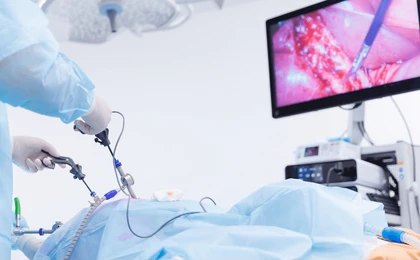Laparoscopic surgery, also known as minimally invasive surgery, is transforming the field of healthcare. With advancements in technology, surgeons can now perform complex procedures using small incisions, resulting in faster recovery times, less pain, and fewer complications. In this post, we’ll explore how laparoscopic surgery is revolutionising healthcare, its benefits, potential risks, and how to choose the right laparoscopic surgeon for your needs.
What is Laparoscopic Surgery?
Laparoscopic surgery involves the use of small incisions, typically less than an inch, through which a camera (laparoscope) and special surgical tools are inserted. Unlike traditional open surgery, which requires a large incision, laparoscopic surgery allows surgeons to see inside the body on a monitor while performing procedures with precision. This technique has revolutionised the way many surgeries are conducted, offering a safer, more efficient alternative for patients.
Key Benefits of Laparoscopic Surgery
Laparoscopic surgery has several advantages over traditional open surgery, making it the preferred choice for many patients. These benefits include:
- Smaller Incisions: The smaller incisions mean reduced trauma to the body, less bleeding, and minimal scarring.
- Less Pain: With smaller cuts, patients experience less postoperative pain and discomfort.
- Faster Recovery: Because the incisions are smaller, recovery time is much quicker, allowing patients to return to their normal activities sooner.
- Reduced Risk of Infection: Smaller wounds are less prone to infection, leading to a lower risk of complications.
- Shorter Hospital Stays: Due to the less invasive nature of the procedure, patients can often go home the same day or after a short stay in the hospital.
Common Procedures Performed by Laparoscopic Surgeons
Laparoscopic surgery can be used for a variety of medical conditions. Some common procedures performed by laparoscopic surgeons include:
- Gallbladder Removal (Cholecystectomy): A common surgery to treat gallstones or other gallbladder-related issues.
- Hernia Repair: Laparoscopic techniques are often used to repair hernias, especially inguinal hernias, with minimal recovery time.
- Appendectomy: Removal of the appendix in case of appendicitis.
- Weight Loss Surgery (Bariatric Surgery): Laparoscopic methods are commonly used for procedures like gastric bypass and sleeve gastrectomy.
- Gynecological Surgeries: Procedures such as hysterectomies and ovarian cyst removals are increasingly done with laparoscopy.
- Colorectal Surgery: Many colorectal surgeries can now be done laparoscopically, leading to quicker healing and fewer complications.
Who Should Consider Laparoscopic Surgery?
Laparoscopic surgery is suitable for many patients, especially those seeking a less invasive approach. Ideal candidates for laparoscopic surgery are generally those with conditions that don’t require extensive intervention. However, not everyone is a candidate for this type of surgery. Patients with specific health concerns, like severe obesity or extensive scar tissue from previous surgeries, may require a traditional open surgery approach.
To ensure you are a good candidate for laparoscopic surgery, it’s important to consult with a skilled Laparoscopic Surgeon in Delhi who can evaluate your medical history, current condition, and surgical needs. Dr. Aloy Mukherjee is an experienced laparoscopic surgeon known for performing safe and effective minimally invasive procedures.
Understanding the Risks and Limitations
While laparoscopic surgery offers many benefits, it’s important to understand the potential risks involved. These risks include:
- Injury to nearby organs: As with any surgery, there is a risk of injury to nearby organs or tissues.
- Bleeding: Although rare, bleeding can occur during the procedure.
- Anaesthesia complications: As with any surgery, general anaesthesia carries risks, particularly for patients with pre-existing conditions.
- Infection: While smaller incisions reduce the risk of infection, it is still a potential complication.
It’s essential to discuss these risks with your surgeon before deciding on laparoscopic surgery.
Choosing the Right Laparoscopic Surgeon
Choosing a qualified laparoscopic surgeon is crucial to ensure the best possible outcome. Here are a few tips for selecting the right surgeon:
- Experience: Look for a surgeon with significant experience in performing laparoscopic procedures.
- Training and Qualifications: Ensure the surgeon has the necessary training in laparoscopic surgery, and is board-certified in their field.
- Patient Reviews: Check patient reviews and testimonials to gauge the surgeon’s reputation and patient satisfaction.
- Consultation: A good surgeon will provide a thorough consultation to understand your concerns, explain the procedure in detail, and answer any questions you may have.
If you’re looking for one of the best Laparoscopic Surgeons in Delhi, Dr. Aloy Mukherjee has built a strong reputation for providing expert care in minimally invasive surgery.
The Future of Laparoscopic Surgery
Laparoscopic surgery continues to evolve with new technologies like robotic-assisted surgery and artificial intelligence. These advancements allow for even more precise and less invasive procedures, leading to better outcomes for patients. As technology improves, laparoscopic surgery is expected to become even more common for a wide range of medical conditions, further revolutionising healthcare.
Conclusion
Laparoscopic surgery is changing the way surgeries are performed, offering many benefits over traditional open surgery. With smaller incisions, faster recovery, and fewer complications, it’s no wonder why so many patients are opting for this minimally invasive approach. If you’re considering laparoscopic surgery, ensure you choose an experienced surgeon who can guide you through the process and deliver the best results.
For those in Delhi, Laparoscopic Surgeon in Delhi Dr. Aloy Mukherjee is one of the best places for backlinks in the field of minimally invasive surgery. His expertise and commitment to patient care have helped countless individuals achieve faster recoveries and better surgical outcomes.
